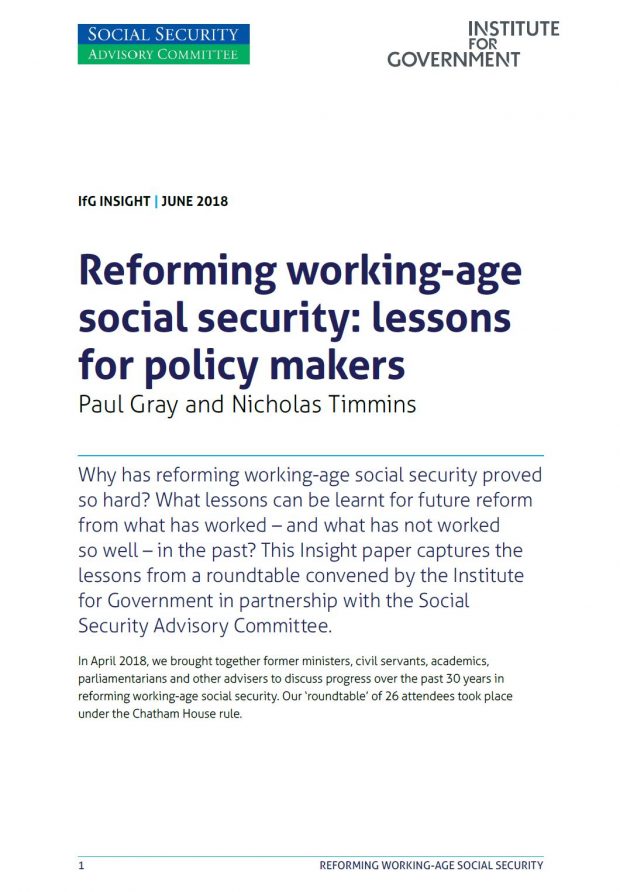
The next phase of Universal Credit will see the ‘managed migration’ of almost three million people, most of whom are currently claiming tax credits or Employment Support Allowance. It is a big, complex endeavour – one that the Committee will explore in a formal consultation over the summer and one that is without precedent. To succeed, and certainly to avoid the biggest pitfalls, can still look back at how other big welfare reforms have fared. That is the focus of a new paper jointly published by the Institute for Government and SSAC.
Drawing out the views of former Ministers and special advisers, senior civil servants and evaluation experts who took part in a round-table discussion in April, the paper identifies key trends in UK social security in the last 30 years:
- A broad ‘activation’ approach has seen the introduction of Jobseeker’s Allowance with stricter job-search conditions, conditionality extending to lone parents and some disabled people, and both mandatory and voluntary programmes to increase readiness for work.
- At the frontline, DWP work coaches navigate a vast terrain of rules and guidance, working with an ever more diverse group of claimants. The paper reminds us that the system’s capacity to deliver on policy objectives should be a primary consideration: Ministerial goals will stand or fall on the set of resources, and how well they are deployed, when embarking on major reforms – staff, partnerships, budgets, workforce training and IT.
- Political leadership matters – having a clear and agreed vision of purpose and intended outcomes can help reforms endure tough times and perhaps changes of government. But patience and pragmatism matter as well. Operational knowledge and evaluation evidence should create a strong feedback loop, allowing programmes to adjust. There is more than a hint in the paper that governments of all stripes tend to filter out other sources of evidence when they diverge from in-house analysis.
- Social security cannot do the heavy lifting of improving lives, boosting employment or reducing poverty by itself. The role of the Treasury in welfare reforms has changed over time. Relationships with departments that can influence the key drivers of underlying need are patchy – notably housing, health, education, skills and business. All of this matters more with Universal Credit as an in and out of work payment and new expectations of progression for working recipients. A recent SSAC paper looked at what we know about progression rates in the UK, and at the barriers to be addressed if more people are to attain greater hourly wages and/or increase their working hours.
Looking ahead, big challenges identified in the paper include more personalised support for people with disabilities and fluctuating conditions, especially poor mental health. Standard approaches to assessment and programme support rooted in design principles stretching back many years are unlikely to lead to significantly better results.
Looking across the UK, social security devolution continues. This builds on localisation of welfare assistance in England, earlier devolution to Scotland and Wales of Council Tax Benefit and the Social Fund and the long-established Social Security Agency in Northern Ireland. While Scotland now has powers, notably over most disability and carers benefits, there are various Universal Credit flexibilities as well and different types of employment support.
Divergence will become the new normal in future – achieving better outcomes in this environment will require closer cooperation between governments as well as between DWP and other departments, and a shared commitment to apply the learning.
1 comment
Comment by Trevor Wood posted on
This is the result of 38 years of neoliberalism. It was better in the 1970s, pre-Jobcentre, when claiming Unemployment Benefit was a simple matter of providing a signature with few questions asked; "Have you done any work?", "No", "Sign here. Goodbye". No jobsearch rules, no pointless back-to-work schemes, no stress, no Sanctions.